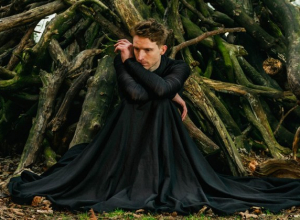Mandela: Long Walk To Freedom Review
Based on his autobiography, this film is clearly designed to be the definitive film about Nelson Mandela. And it tells his remarkable story with skill, tracing his life from 25 to 75 while touching on why he's perhaps the most important figure of the past century. So it's no wonder that the film feels far too constructed and polished.

It starts in his Xhosa village birthplace, then follows Nelson (Elba) to Johannesburg in the 1940s as a sparky young lawyer with a loving wife (Pheto) and children. But the vicious injustice of Apartheid gets under his skin, and as he starts speaking out and taking action, his marriage falls apart. South Africa's government responds to protests by cracking down even further, so Nelson's African National Congress turns to violence. As a result, its leaders are sentenced to hard labour on Robben Island. Now married to the outspoken Winnie (Harris) with two more daughters, Nelson is sent away for life. But he refuses to let bitterness gain a foothold, and devises a way for the nation to peacefully transition into democracy.
Mandela's legacy lies in his wisdom and open-mindedness, avoiding a bloodbath by seeking reconciliation rather than revenge. And these themes play an important role in Nicholson's script, which of course has to condense the events drastically, even for a two-and-a-half hour movie. But all of the key moments are here, and even if the film sometimes feels like it's racing through them, there's plenty of subtext for the actors to grab hold of.
Continue reading: Mandela: Long Walk To Freedom Review






![Luke De-Sciscio talks to us about having the courage to be yourself, forgiving that which is outside of one's control and following whims [EXCLUSIVE] Luke De-Sciscio talks to us about having the courage to be yourself, forgiving that which is outside of one's control and following whims [EXCLUSIVE]](https://images.contactmusic.com/images/home/homepage/luke-de-sciscio-abof-a.jpg)

